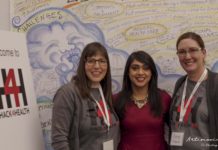Who is the intended audience for this course?
The intended audience for the course is both non-science and science students. Very few science students at this university actually have the opportunity to study quantum mechanics — this course is also aimed at those science students who want an opportunity to learn about quantum mechanics (And physics students who have studied quantum mechanics will likely find that the conceptual puzzles and historical background are covered in greater depth than in their physics courses).
Why do you like to teach this course? What’s the most rewarding aspect?
I teach this course because I believe that it is important for all students at this university to have an understanding of the basics of quantum mechanics. What is novel about quantum mechanics compared with previous theories in physics? How have scientists’ understandings of quantum mechanics changed over time? How is quantum mechanics being used to develop new technologies? Citizens need to have a basic understanding of relevant science in order to participate in decision making. The most rewarding part of teaching this course is being with students when they come to the realization that quantum mechanics thwarts our most basic expectations about how objects behave.
Can you name some practical applications for this course that non-science students might not realize?
A lesson of quantum research over the past century is that basic scientific research that can appear to have no practical applications turns out to have huge practical and ethical implications. One example is the development of the atomic bomb, which we discuss in the course. Another example is the current effort to develop quantum computers, which has implications for data security. We will examine University of Waterloo professor Michele Mosca’s work on this issue in the course.
Of course, the impractical implications will also be covered. For example: Does quantum mechanics entail that there are an infinite number of parallel universes to our own?
Does the course require any math, labs or other traditional science course aspects? Or is the coursework more essay/project based?
The course materials include videos and simulations as well as more traditional readings (I have been doing pedagogical research in this course on the effectiveness of multimedia materials supported by a LITE grant from the university). Some classic experiments will be demonstrated in class. No background in mathematics is needed for the course. We will discuss what the equations mean, but there are no problem sets. The assessment takes the form of quizzes and written assignments. The assignments involve engaging with philosophical, historical, and popular discussions of quantum mechanics. Again, students have an opportunity to choose among sources in a variety of media (e.g., videos of public lectures, book chapters).
What lead you from being a philosophy professor to wanting to explore teaching quantum mechanics? How does your philosophy background aid your quantum mechanics teaching?
My undergraduate degree was in physics, mathematics, and philosophy, so I have been combining these interests for a long time. Quantum mechanics presents paradoxes and does not present a straightforward and unambiguous picture of reality–this is the sort of situation that attracts (and frustrates!) philosophers! Both history and philosophy of science have informed my teaching of quantum mechanics. Considering quantum mechanics as one among many examples of conceptual revolutions that have occurred in the history of science is a helpful perspective. Philosophy of science has developed models for understanding conceptual revolutions. The history of quantum mechanics is also a rich source of teaching materials. Scholars have been trying to explain quantum mechanics to scientists and the general public for over a century now.
Do you have any book recommendations for students who want to engage more with quantum science?
Louisa Gilder’s The Age of Entanglement and George Musser’s Spooky Action at a Distance are both engaging books aimed at a general audience. Gilder’s book tells the stories of the people who contributed to quantum mechanics and their debates. Musser’s book focuses on how quantum mechanics might change our views about space and includes interesting interviews with scientists and philosophers at the forefront of these discoveries. Students should also check out the resources we are lucky to have locally. Quantum: The Exhibition now on display at TheMuseum in Kitchener is excellent. There are public lectures at the Perimeter Institute and on campus that are also recorded and posted online.
Do you have a favourite movie or TV show or book that you recommend to people who say they don’t like quantum science or science in general to help persuade them otherwise?
What’s not to like about science? But for those who need convincing, the human side of doing particle physics really comes through in the documentary Particle Fever (on Netflix), which chronicles the excitements and disappointments of the Large Hadron Collider experiment. And anybody who likes Angry Birds should check out the quantum version Quantum Cats, which was developed here at the University of Waterloo.






























